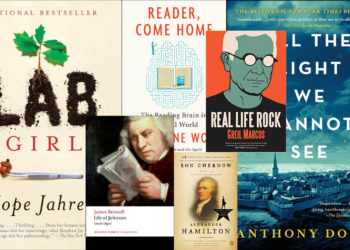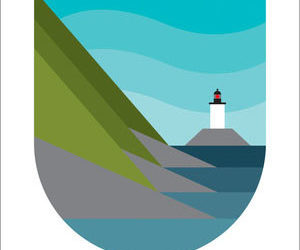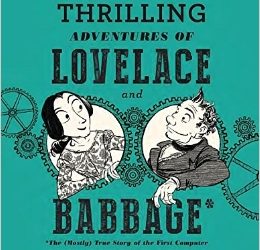Editor’s Note: Continuing an annual tradition, we take a moment to pause at year’s end to look back on the best books we encountered. As always, this is not a “best books of 2019″ list, but a list of the best books the Chefs read during 2019 — the books might be classics, a few years old, or brand new. This is one of the great things about books in all forms — they endure, invite visitation and revisitation, and beckon with ideas. Here’s Part 1 of our list, Part 2 is here.
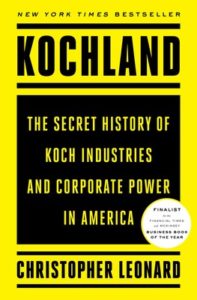 Joseph Esposito: Trigger warning: My pick for best book of the year gives new meaning to the phrase “evil genius.”
Joseph Esposito: Trigger warning: My pick for best book of the year gives new meaning to the phrase “evil genius.”
Now that we have sent the kids to bed, I can tell you that David Leonard’s Kochland: The Secret History of Koch Industries and Corporate Power in America is an outstanding work of investigative journalism. It is the tale of Koch Industries and its principal architect, Charles Koch, who transformed a libertarian outlook into one of the world’s most successful companies and a political movement that has challenged the very idea of government. At the heart of Charles Koch’s leadership is “market based management,” (MBM) a set of principles for running an enterprise, but as the reader moves through the book, MBM emerges not only as a business strategy but also a blueprint of a moral philosophy. Shrewd business management enabled Charles to reap huge profits in smokestack industries, at an untold environmental cost. To keep the pesky regulators off his back, he funded numerous political organizations and think tanks, using his influence to help friendly judges get appointed and interfering with anything resembling government oversight. The details of the story are often astonishing, as when Charles took advantage of a loophole (Canadian oil, unlike other imports, was not taxed) to build a hugely profitable refinery in Minnesota, one of the few that could handle Canada’s sulfur-rich oil; or when Koch Industries used its inside information to drive a hugely successful derivatives trading operation.
There is something here to hate for everyone: environmental cynicism, terrible labor practices, political manipulation, and a thoroughgoing disregard for electoral norms. If there is one thing the book makes absolutely clear it is that however much you might detest Koch, it is never good to underestimate your adversary.
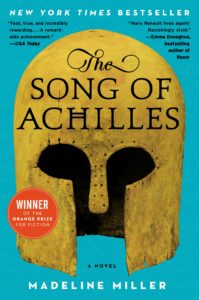 David Crotty: Without a doubt, the best book I read in the last year was The Song of Achilles by Madeline Miller. Last year, Jill O’Neill recommended Miller’s Circe, and if you enjoyed that, her earlier re-telling of the story of Achilles is highly recommended. Told from the point of view of Achilles’ lifelong friend and lover Patroclus, the story is beautifully heartbreaking, as Achilles must choose between a long and uneventful life or a short and glorious existence that realizes his full potential. Speaking of last year’s recommendations, this month marks the final issue of Ryan North’s The Unbeatable Squirrel Girl, which I suggested as the perfect gift for the comic lover in your life — smart, funny, and unfailingly thoughtful and kind (particularly since it sits squarely in the greater Marvel comics universe). North ended his five year run triumphantly, and the series was remarkably consistent without a single misstep or down moment. I know I will miss the monthly joy of sharing it with my son.
David Crotty: Without a doubt, the best book I read in the last year was The Song of Achilles by Madeline Miller. Last year, Jill O’Neill recommended Miller’s Circe, and if you enjoyed that, her earlier re-telling of the story of Achilles is highly recommended. Told from the point of view of Achilles’ lifelong friend and lover Patroclus, the story is beautifully heartbreaking, as Achilles must choose between a long and uneventful life or a short and glorious existence that realizes his full potential. Speaking of last year’s recommendations, this month marks the final issue of Ryan North’s The Unbeatable Squirrel Girl, which I suggested as the perfect gift for the comic lover in your life — smart, funny, and unfailingly thoughtful and kind (particularly since it sits squarely in the greater Marvel comics universe). North ended his five year run triumphantly, and the series was remarkably consistent without a single misstep or down moment. I know I will miss the monthly joy of sharing it with my son.
But the book I want to write about this year is Neal Stephenson’s Fall; or, Dodge in Hell: A Novel. Back in 2016, Michael Clarke wrote about Stephenson’s Seveneves, and like that book, Fall is an enormous tome telling a sprawling story that takes place over a long period of time. It’s similarly overstuffed with ideas, centering around the story of a computer entrepreneur whose brain is carefully mapped and uploaded to a virtual computational existence. The story looks into the nature of consciousness and the development of human society. The virtual world goes through phases resembling the myths of the Greek Gods, the Christian Old Testament, and The Lord of The Rings. The underlying idea, though never outright expressed, is the likelihood that our own existence is merely a computer simulation, and that our mythologies, religions, and literature may in reality be factual re-tellings of different eras of our virtual universe.
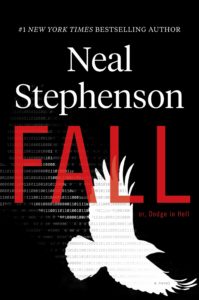 The reason I wanted to write about Fall here though, is that it contains perhaps the best (and most brutal) explanation I have read of the current (or near future) state of the internet and the culture it has spawned. In the book, any person who comes to any public attention has their life destroyed by a seemingly endless number of online truthers and conspiracy theorists who take it upon themselves to doxx, slander, and spread lies about anyone and anything that comes to their attention. An enormous worldwide scam is perpetrated online, reducing trust. This is followed by the release of bots that flood out enormous quantities of spurious information about every person, living or dead, which renders the internet completely unusable, and it collapses. What replaces it represents a split in society between the “reality based community”, largely living in population centers, and “Ameristan”, those who prefer a world that conforms to their biases and personal beliefs. The reality folks all use a new version of the internet that employs personal “Editors”, people whose job is to filter and verify an individual’s incoming and outgoing information, carefully curating that person’s feed and online persona (so perhaps there is a future for us curators after all!).
The reason I wanted to write about Fall here though, is that it contains perhaps the best (and most brutal) explanation I have read of the current (or near future) state of the internet and the culture it has spawned. In the book, any person who comes to any public attention has their life destroyed by a seemingly endless number of online truthers and conspiracy theorists who take it upon themselves to doxx, slander, and spread lies about anyone and anything that comes to their attention. An enormous worldwide scam is perpetrated online, reducing trust. This is followed by the release of bots that flood out enormous quantities of spurious information about every person, living or dead, which renders the internet completely unusable, and it collapses. What replaces it represents a split in society between the “reality based community”, largely living in population centers, and “Ameristan”, those who prefer a world that conforms to their biases and personal beliefs. The reality folks all use a new version of the internet that employs personal “Editors”, people whose job is to filter and verify an individual’s incoming and outgoing information, carefully curating that person’s feed and online persona (so perhaps there is a future for us curators after all!).
This dystopian vision of the near-future strikes me as painfully accurate, given the increasing divides in our society. I was thinking about it a lot during Annie Callanan’s keynote talk at the STM Meeting in Frankfurt, where she spoke about the vital role that publishers can play in resolving the world’s struggles in a “post-truth” era. What she failed to account for, as Stephenson points out, is that an enormous portion of the population does not want the truth. They know how they feel, and they want the dopamine rush that comes from having those feelings confirmed. There’s a huge amount of money to be made by those willing to exploit this population. This is our current reality, and the challenge is not just to find ways to present the truth, but how to get that truth through to those who are actively seeking out just the opposite.
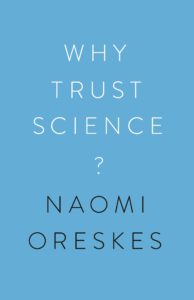 Lettie Conrad: For both its evidence-based rigor and striking honesty, Why Trust Science? by Naomi Oreskes should be required reading for everyone in scholarly communications. Addressing the broadest view of science possible — from the experimental to the historical — this book offers crisp, accessible writing and draws important connections to our world of research dissemination and publishing.
Lettie Conrad: For both its evidence-based rigor and striking honesty, Why Trust Science? by Naomi Oreskes should be required reading for everyone in scholarly communications. Addressing the broadest view of science possible — from the experimental to the historical — this book offers crisp, accessible writing and draws important connections to our world of research dissemination and publishing.
As an historian of science, and as a scientist herself, Oreskes begins with the blatantly obvious, yet sobering reality that science sometimes get it wrong — whether intentional or not, researchers have been known to misinform readers. One hundred years ago, American scientists were convinced continental drift theories were incorrect due to poor methodology by their European counterparts. While geological research eventually proved the concept of continental drift to be accurate, challenging the theory led to more research and analysis from various fields of study, thereby extending and enriching our understanding of the multiple causes for tectonic movements. Oreskes uses this example, among several others, to demonstrate the human limitations on scientific progress. She argues that a lack of randomized trials does not equate to a lack of evidence. While a complete grasp of every truth may be beyond our capacity, Oreskes outlines how human knowledge is stronger with multiple research perspectives and extensive effort applied — “in diversity there is epistemic strength,” she says.
Structured around a series of Oreskes’ lectures, and her dialogues with expert reactions to these lectures, the book leads us through a series of debates about the human biases, both innocent and otherwise, that are built into our systems that support scholarly research and dissemination. As a socially enabled human construct, Oreskes encourages us to acknowledge that cultural mores, religious beliefs, and political values impact our ability to achieve equal “epistemic strength” for all research questions that face humanity.
Oreskes argues that the answer is not a value-less or neutral research community — instead, Oreskes says the answer lies in being honest about our beliefs and values, as they are as relevant to analytical outcomes as the original data researchers produce. Only when we clearly state our worldviews within the context of our research, can both offer our readers a transparent understanding of our work and avoid misinforming readers. These lessons are key for those in scholarly communications, who are key players in this socially enabled system of scientific research and dissemination. By honestly examining and declaring our personal and organizational perspectives, privileges, and proclivities, we can contribute to a more open, transparent scholarly ecosystem.
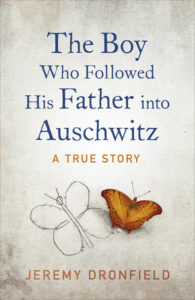 Robert Harington: Most years, selecting a favorite book is a struggle – I consume both fiction and non-fiction in print and through Audible, making it hard to pick a clear favorite. But for 2019 there is a book that, for me, stands head and shoulders above any other: The Boy Who Followed His Father into Auschwitz, by Jeremy Dronfield. This is a remarkable, true story, told deploying the conventions of a novel, with elegant prose that leaves you reeling from the horror of the Holocaust and leaves us no closer to understanding how ordinary people could turn on Jewish friends and neighbors, denying their humanity, losing their individuality to the mob, and sending so many to their death. It tells the story of the Kleinmann family by zeroing in on Gustav Kleinmann, born in Galicia (a province of the Austro-Hungarian Empire that straddled current-day Poland and Ukraine), and his son, Fritz. This book launches you on a devastating journey for father and son, from initial Nazi occupation to the camps of Buchenwald and Auschwitz, to the improbable ending of making it through alive and able to tell the story. As Dronfield states, “There are many Holocaust stories, but not like this one.”
Robert Harington: Most years, selecting a favorite book is a struggle – I consume both fiction and non-fiction in print and through Audible, making it hard to pick a clear favorite. But for 2019 there is a book that, for me, stands head and shoulders above any other: The Boy Who Followed His Father into Auschwitz, by Jeremy Dronfield. This is a remarkable, true story, told deploying the conventions of a novel, with elegant prose that leaves you reeling from the horror of the Holocaust and leaves us no closer to understanding how ordinary people could turn on Jewish friends and neighbors, denying their humanity, losing their individuality to the mob, and sending so many to their death. It tells the story of the Kleinmann family by zeroing in on Gustav Kleinmann, born in Galicia (a province of the Austro-Hungarian Empire that straddled current-day Poland and Ukraine), and his son, Fritz. This book launches you on a devastating journey for father and son, from initial Nazi occupation to the camps of Buchenwald and Auschwitz, to the improbable ending of making it through alive and able to tell the story. As Dronfield states, “There are many Holocaust stories, but not like this one.”
For me, this story is close to home. My family, on my Mother’s side, is of similar origin. My grandparents were prominent Viennese Jews, born in Poland, who traced the same path as the Kleinmanns, but tragically did not survive the camps. My grandfather was only a few prisoner numbers apart from Gustav Kleinmann, and it is highly likely they knew each other, both in Buchenwald and on the train journey to Auschwitz that Polish Jews were forced to endure. I have fragments of information about life in Buchenwald, but here we have a first-hand account of what my grandfather must have endured. My grandmother was also sent to Auschwitz and died there. My mother and her sister escaped to England on the Kindertransport at the ages of eleven and nine, respectively – never to see their parents again.
Dronfield quotes the German writer and playwright, Carl Zuckmayer: “The Netherworld had opened its portals and spewed out its basest, most horrid and filthiest spirits…What was being unleashed here was the revolt of envy; malevolence; bitterness; blind, vicious vengefulness.” As a reader, glued to the page, you ask yourself how ordinary people could abandon all humanity as they embraced the Nazis into Austria. There was a suddenness in how events unfurled. Gustav and his son, Fritz, were reported to the stormtroopers by their neighbors and their close friends. I am not going to take you through the horrors detailed in the book in this review, but Dronfield reveals the particular hatred the Nazis had for Jews of Polish origin. When Polish Jews were transferred to Auschwitz by train, Fritz remarkably managed to stay alongside his father. In Auschwitz, prisoners had a life expectancy of only a few months before entering the gas chambers. Father and son ended up at a sub-camp (Monowitz) and then on a forced death march, but Fritz managed to escape. His father was too weak to follow, but this is a story of survival – and Fritz lives to tell this story.
As you read this book, you return time and time again with the question of how this could happen. You wonder, could this happen here? What does it take for those around you to lose their humanity? Are we, as we like to imagine, immune from such forces? Unfortunately, I believe we are not immune, and it is in appreciating the diversity of thought and cultures that come with immigration that we inoculate against the rise of hate (while recognizing at the same time that immigration may threaten some among us). You may ask these questions of yourself as you read this book – at once beautifully written and horrifying.
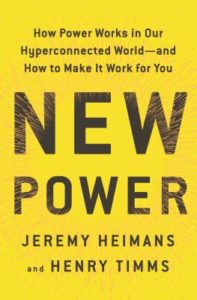 Jasmine Wallace: This year I have been attempting to read two new books a month, so it was hard for me to pick just one book for this post. That being said – the two best two books I’ve read this year were New Power by co-authors Jeremy Heimans and Henry Timms, and Radical Candor by Kim Scott.
Jasmine Wallace: This year I have been attempting to read two new books a month, so it was hard for me to pick just one book for this post. That being said – the two best two books I’ve read this year were New Power by co-authors Jeremy Heimans and Henry Timms, and Radical Candor by Kim Scott.
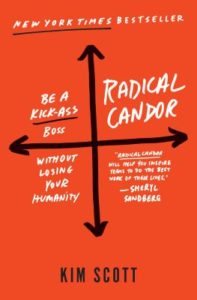 In combination (or separately, if you prefer), these books are power tools that act as guides to develop communication, collaboration, critical thinking and creativity. They provide practical, yet thought-provoking advice on team development, openness and leadership. In New Power, Heimans and Timms share their study on “the New Power World”, which they describe as a shift from exclusive expertise to open innovation being the charge of tomorrow. In this dynamic book they walk the reader through examples of this cultural shift and provide advice on how to best move ahead in an uber connected world. Scott, similarly acknowledges that the workforce of tomorrow requires a new type of thinking. One that considers not just what needs to get done, but how you think and feel while getting it done. In Radical Candor, Scott provides a framework for guiding any team to achieve results.
In combination (or separately, if you prefer), these books are power tools that act as guides to develop communication, collaboration, critical thinking and creativity. They provide practical, yet thought-provoking advice on team development, openness and leadership. In New Power, Heimans and Timms share their study on “the New Power World”, which they describe as a shift from exclusive expertise to open innovation being the charge of tomorrow. In this dynamic book they walk the reader through examples of this cultural shift and provide advice on how to best move ahead in an uber connected world. Scott, similarly acknowledges that the workforce of tomorrow requires a new type of thinking. One that considers not just what needs to get done, but how you think and feel while getting it done. In Radical Candor, Scott provides a framework for guiding any team to achieve results.
Ultimately, both books tackle how to get ahead of the curve in a world that is demanding openness and innovation. These books shifted not just my perspective on the future of our industry, but also the work I am doing day-to-day. Both books were incredible reads that I have now added to my quick grab book section when approaching any new project!
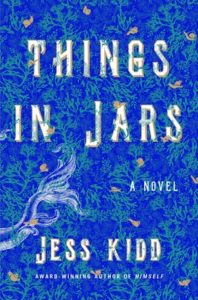 Alice Meadows: This year, rather than picking a book, I am picking an author – the totally fabulous Jess Kidd, who was recommended by my friend, the equally fabulous Lee Randall. I devoured Kidd’s three books, Himself, Mr Flood’s Last Resort (published as The Hoarder outside of the US), and Things in Jars, reading them more or less back to back. All of them are a unique and entrancing blend of mystery, romance, and fantasy/ghost story — I found them utterly un-put-downable. And Kidd’s writing is just beautiful; it reminds me in many ways of Dylan Thomas — rich, lyrical, almost poetical. I loved all three, but my favorite has to be the most recent, Things in Jars, not least because it reminds me so much of my all-time favorite children’s books, The Wolves Chronicles by Joan Aiken. Unlike the others, it’s a historical novel and the chief protagonist, Bridie Devine (Kidd’s favorite so far, according to her website), is a joy of a character — a smart, opinionated, strong, resourceful Victorian private detective. The plot twists and turns, at times shocking, scary, heartbreaking, funny, and outrageous, but ultimately hopeful. I really can’t recommend this, or Kidd’s other books, highly enough. And I can’t wait for her next one!
Alice Meadows: This year, rather than picking a book, I am picking an author – the totally fabulous Jess Kidd, who was recommended by my friend, the equally fabulous Lee Randall. I devoured Kidd’s three books, Himself, Mr Flood’s Last Resort (published as The Hoarder outside of the US), and Things in Jars, reading them more or less back to back. All of them are a unique and entrancing blend of mystery, romance, and fantasy/ghost story — I found them utterly un-put-downable. And Kidd’s writing is just beautiful; it reminds me in many ways of Dylan Thomas — rich, lyrical, almost poetical. I loved all three, but my favorite has to be the most recent, Things in Jars, not least because it reminds me so much of my all-time favorite children’s books, The Wolves Chronicles by Joan Aiken. Unlike the others, it’s a historical novel and the chief protagonist, Bridie Devine (Kidd’s favorite so far, according to her website), is a joy of a character — a smart, opinionated, strong, resourceful Victorian private detective. The plot twists and turns, at times shocking, scary, heartbreaking, funny, and outrageous, but ultimately hopeful. I really can’t recommend this, or Kidd’s other books, highly enough. And I can’t wait for her next one!
Discussion
11 Thoughts on "Chefs’ Selections: The Best Books Read During 2019 Part 1"
“Without a doubt, the best book I read in the last year was The Song of Achilles by Madeline Miller.” For me it was 2015, still resonates, a great book. If you want another take on the story try The Silence of the Girls by Pat Barker which I read this year. A nice comparison on the two: https://novelvisits.com/the-silence-of-the-girls-the-song-of-achilles-review/
So…many…serious…topics!
Any fun book recommendations? We know its a serious website but we publishers need to chill-out a bit too 🙂
Waiting for the next round.
For most of us, 2019 was a pretty serious year! (or maybe the serious stuff is just more fun to write about). If you lean toward science fiction, “This Is How You Lose The Time War” and “Gideon the 9th” are both pretty fun.
I tend to agree with you Deen. When I’m reading for pleasure I (mostly) read to escape, so my choice is definitely not serious; I promise you, Jess Kidd’s books are wonderfully escapist! However, thanks in large part to the more serious-minded members of my book club I do also read titles that I would never normally choose. This year’s standout on that front was Just Mercy by Bryan Stevenson.
For light but intelligent SF reading I love Martha Wells and her “Murderbot” series… I suppose technically it is YA but its theme is AI and robotic consciousness and the nature of self… each book can be read on a medium flight…
Do you have a recommendation for a particularly well read Audible selection?
I’m a big fan of John Hodgman’s work, and his audiobooks (which he reads himself) are superb. His earlier works are transformed into something entirely new with the audio production (I wrote about these in 2012 here: https://scholarlykitchen.sspnet.org/2012/12/17/chefs-selections-the-best-books-read-during-2012/), and his newer, more personal works are more straightforward but just as enjoyable. Also a big fan of Neil Gaiman reading any of the books he has written.
Hi, The description of “Fall” sounds really great. But no other description of it that I read, including the one that you’ve linked to, seems to be talking about the same story. Is it possible that the blurb next to “Fall” is for another book? Many thanks.
For a lovely read, pick up Ross Gay’s “The Book of Delights: Essays”. Most essays are one page, and a blend of humor and contemplation. I am giving copies to friends/family for Christmas gifts, it’s that good.
